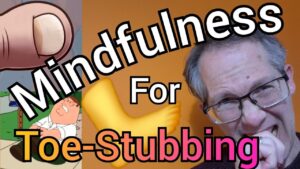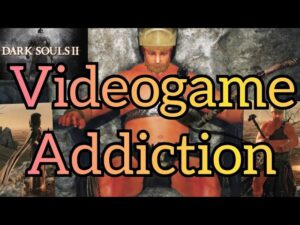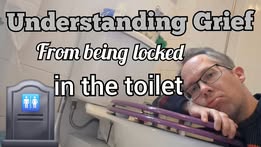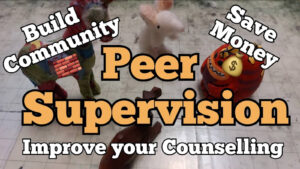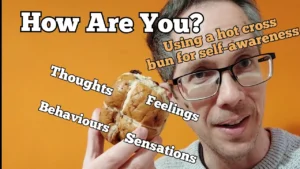This Article originally featured in Hope Therapy’s Talk Room Podcast, where I was a guest. I have embedded the video (about half an hour in length) which expands on the points in this article, and you may prefer to watch the video or to do so as you read the article.
Introduction to Death Anxiety
Death anxiety involves thoughts of death: becoming invasive and distracting.
Being aware of our own, and others mortality is a healthy thing – it protects us from taking risks and gives us perspective in life
As far as the DMS-5 is concerned, it isn’t a medical condition, but relates to Specific Phobias, Generalised Anxiety Disorders and Panic Disorders
Indicators for seeking support on Death Anxiety
- These thoughts have been persistent, perhaps for six months rather than a recent phase
- They are preventing you from being able to live a normal life
- You are finding yourself easily triggered into Death Anxiety related thoughts and sensations
- The thoughts are accompanied by panic and anxiety
- It presents physically in the body, for example with Panic Attacks
- You are structuring your life to avoid specific triggers
- It leads to intrusive suicidal thoughts
Therapeutic questions or topics
- What specifically you are thinking about
Your own death or others’, aging, life after death, or existential issues like life’s purpose - Any beliefs underpinning this fear of death, and if those beliefs can be challenged
e.g. Does my life have significance? My relative died therefore my death is imminent. Because there is an end-date nothing matters - Gradually exposing yourself to the things that trigger you
- Boosting self-belief and self-esteem
Which is protective against death anxiety - Helping you process life events that might influence your death anxiety
like bereavements, trauma, or near-death experiences - Engaging with the concept of your own death
planning for it, demystifying ideas of what death may be like, developing Continuing Bonds with people who have died - Creating bodily awareness of how Death Anxiety presents
which may involve experiencing overwhelm or panic attack in session with a counsellor and learning how to regulate this from the counsellors empathic attunement and pacing, or using self-soothing techniques like mindfulness. - Companionship from connecting with a counsellor or other secure relationship
which can bring relief to issues such as death anxiety
Why death anxiety is prevalent
- News reporting & mentions of deaths
In the last five years we’ve had & continue having several major wars, the death of the queen, the covid pandemic, and the news generally reports on near-misses or death (take for example the assassination attempt on Donald Trump last week). All of this is reported in a cold factual manner. - World threats
We are aware of the climate crisis and recent hot summers with this 1.5°C target seeming ever more futile. Nuclear threats or threats of war. The NHS struggling making us wonder if we will be supported should we become unwell. The rise of AI fearing what this power might do. Cost of living crisis or aging crisis wondering if we will be financially secure to support ourselves or ever retire. - Social media
Spreading further fears, as well as a systemic disconnection from relationships and support that would have before been protective in an increasingly digital superficial world. - Death denial in culture
Death being rare, and dead bodies being removed from the public eye; a discomfort with grief and cultural expectation to stop mourning post-funeral creating a loneliness for the bereaved, death as a taboo we rarely talk about so isolating ourselves when the reality of death ruminates in our mind.
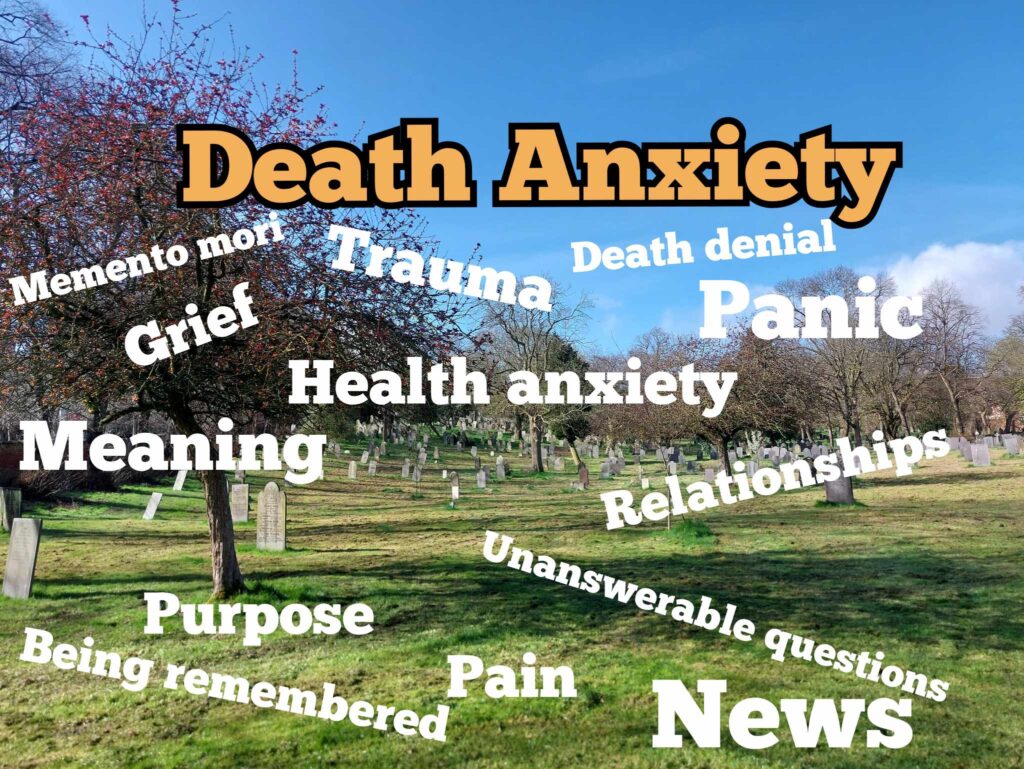
Panic Attacks
Because we can be isolated in death thoughts or death anxiety, and death is such a huge existential issue that we cannot fathom or process, Death Anxiety can viscerally present itself in Panic Attacks.
Panic Attacks have similarities to heart attacks in terms of sensation: heart palpitations, sweating, dizziness, dissociation, dread, panic….
Panic Attacks have an emotional, traumatic, or mental trigger; but feel physically like a heart attack and quite beyond our control so Death Anxiety can viscerally feel like we are going to die.
Within counselling, being curious what is happening in the body can help, as well as exploring when it is likely to happen, what thoughts or sensations are there, and even if we can experience it within the session and if the fear of it can decrease through exposure to it.
Outside of therapy, grounding techniques can help such as using the senses to notice what is going on in the room as a distraction from the visceral experience of the panic attack: what we can smell, see, hear, feel, taste….
Post-traumatic Growth and nativating death anxiety
In Latin, there is a phrase memento mori (“remember you will die”) that was said as a philosophical encouragement to help in life. Indeed, navigating awareness of our own mortality can often bring with it a sense of peace or completeness. Although unpleasant, a post-traumatic growth from wrestling through it.
Some benefits from processing an awareness of ours and other’s moralities include:
- Procrastination
If life has a time limit, then we cannot keep comfortably deferring decisions and this deadline can inspire change and action. We can embrace difficult tasks, knowing we do not know how long our life has to make an impact. - Perspective
In one hundred years the things we have worked hard to possess will have gone, and our name may well have been forgotten. Realising our lack of significance can give perspective and subtract from the anxiety and importance we put on things. On our death bed we are unlikely to care about how late we stayed at the office. It can remove pressure and the worries that seemed so important can become small. - Meaning
We can think about what really gives our life meaning, what we share, and our legacy. Our relationships and if we are nurturing them, if we are aligned with our values and recognising what gives us a sense of purpose, and if we are neglecting an aspect of ourselves that needs our focus. - Health
The pressures in life can lead us to neglect ourselves, thinking we will concern ourselves with our health when we are in later stages of life. Realising we will age can help us to start investing in our futures today and make steps towards holistic healthy living. - Gratitude and Presence
This moment we have right now is all we have. Now are the good days. Can we grow an appreciation and gratitude for the moment. Can we be mindful of each day, and learn to embrace the moment?
Conclusion
Death Anxiety is a distressing preoccupation with death that presents in thoughts, feelings, and bodily. It can be closely related to bereavements or awareness of our own mortality. Counselling can help to explore death anxiety, process what is contributing towards it, and even emerge outside of it with a sense of growth.
You may wish to explore this other article I have written on bereavement and if theory can help. Some of the theories such as Kubler Ross explore becoming aware of our own mortality through terminal illness which is closely related to death anxiety.
Simon is a Person-Centred Counsellor in Oxford working remotely and in person. He trained and worked with Cruse Bereavement Care in both their committee and seeing clients for bereavement support and continues offering a safe place to grieve as a counsellor


